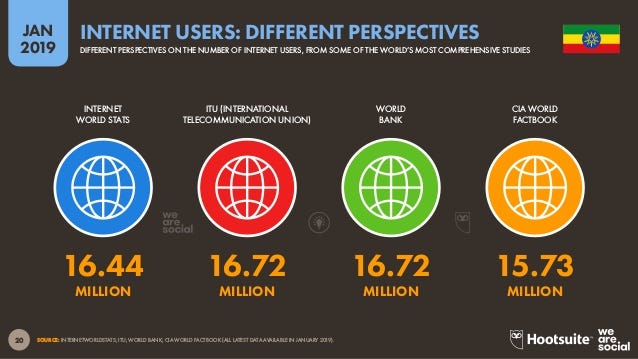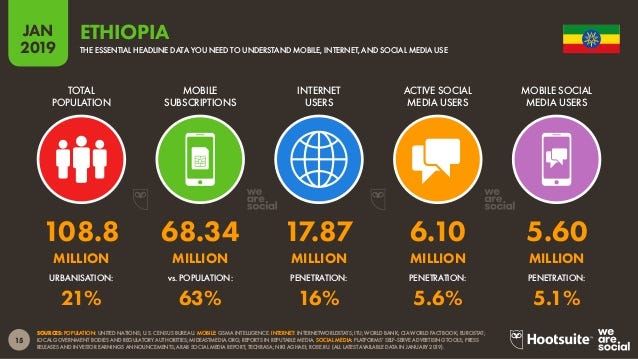Ethiopia Empowers Ethio Telecom To Venture Into Financial Services
Ethio Telecom, Ethiopia’s only telecommunication company’s rollercoaster ride in the country is far from over. Apart from recently being granted a mobile money license, the country’s Council of Ministers has amended the law establishing the telecom company to enable it to render financial services in Ethiopia. A statement from the Council of Minister on January 8 hinted that the amendment would enable Ethio Telecom to catch up with the industry’s fast development and to provide additional or related services by using its infrastructure.

Before now, the existing regulation that was amended only allowed Ethio Telecom to provide and make accessible next generation network-based, world-class information technology services; to engage, in accordance with development policies and priorities of the government, in the construction, operation, maintenance and expansion of telecommunications networks and services; and to provide domestic and international voice, data, video, and other related value-added services.
Read also:MTN Cameroon Partners With MoneyGram To Receive International Money Transfers By Mobile Money
What Would The New Amendment Mean For The Proposed Sale Of 40% Stake In Ethio Telecom To Foreigners?
The new amendment is already throwing up controversies. Plans have been on since October 2019 to allow private companies (mostly foreign companies: two out of either Etisalat, Axian, MTN, Orange, Saudi Telecom Company, Telkom SA, Liquid Telecom, Snail Mobile, and Global Partnership for Ethiopia, a consortium of telecom operatorscomprising Vodafone, Vodacom, and Safaricom) to take up to 40% stake in Ethio Telecom. But then banking, insurance, brokerage services, legal consultancy and other financial services still remain off limits for foreign investors, according to a new set of investment rules published on the Ethiopian Investment Commission’s website.
“Since the enterprise’s 40 percent share would be owned by foreign investors indirectly it will allow foreign companies or individuals to be involved in the financial sector, which is exclusively reserved for Ethiopians and Ethiopian Diasporas,” argued a source cited by Capital, a local media outlet.
However, another source explained that the amendment would not have any effect and that the privatization process would be undertaken as per the given schedule.
“The cabinet decision is only amending the regulation that the telecom operators demand to expand its business on other sectors,” an expert who is familiar with the case explained.
“Due to that, it will not be related with the privatization process. It will be clear when the privatization process and negotiation are finalized in the future. So far, Ethio Telecom is a public enterprise and you may not reject its demand to expand its operation and revenue,” the expert added.
Ethio Telecom financial services Ethio Telecom financial services
Read also: Ethiopia’s Only Telecom Company Ethio Telecom Finally Goes Mobile Money
In October 2020, after series of negotiations and deliberations, the National Bank of Ethiopia (NBE) finally granted a license to the company to start mobile money service in the east African country.
In April 2020, the National Bank of Ethiopia issued a regulation called Licensing & Authorization of Payment Instrument Issuers. For the first time in Ethiopia’s history, the regulatory regime will allow mobile money transactions. However, there is a caveat: any company interested in the new financial service regime must set up a trust account with a deposit money bank in Ethiopia.
“As part of the application process,” the directive read, in parts, “the National Bank, may request for a preliminary meeting and demonstration of the intended payment instrument to be issued, its related services, products as well as operation. Based on requests made and written approval of the National Bank, a payment instrument issuer may be allowed to provide cash-in and cash-out; local money transfers including domestic remittances, load to card or bank account, transfer to card or bank account; domestic payments including purchase from physical merchants, bill payments; over-the-counter transactions; and inward international remittances services.”
The regulation has also opened up the country’s financial services sector to include that a licensed payment instrument issuer may, with the relevant agreement with regulated financial institutions and pension funds, be allowed to provide micro-saving products; micro-credit products; micro-insurance products; or pension products in the country.
Charles Rapulu Udoh

Charles Rapulu Udoh is a Lagos-based lawyer who has advised startups across Africa on issues such as startup funding (Venture Capital, Debt financing, private equity, angel investing etc), taxation, strategies, etc. He also has special focus on the protection of business or brands’ intellectual property rights ( such as trademark, patent or design) across Africa and other foreign jurisdictions.
He is well versed on issues of ESG (sustainability), media and entertainment law, corporate finance and governance.
He is also an award-winning writer












